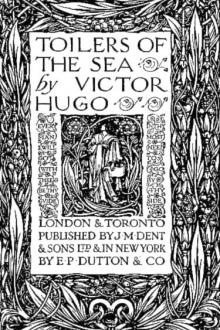Toilers of the Sea by Victor Hugo (trending books to read txt) 📕

- Author: Victor Hugo
- Performer: -
Book online «Toilers of the Sea by Victor Hugo (trending books to read txt) 📕». Author Victor Hugo
"Sir," remarked the inhabitant of Guernsey, "you have an answer for everything."
The tourist interposed with a question:
"Have we to pass all that legion of rocks?"
"No; we have left it to the sou'-south-east. It is behind us."
And the Guernsey passenger continued:
"Big and little rocks together, the Grelets have fifty-seven peaks."
"And the Minquiers forty-eight," said the other.
The dialogue was now confined to the St. Malo and the Guernsey passenger.
"It strikes me, Monsieur St. Malo, that there are three rocks which you have not included."
"I mentioned all."
"From the Derée to the Maître Ile."
"And Les Maisons?"
"Yes; seven rocks in the midst of the Minquiers."
"I see you know the very stones."
"If I didn't know the stones, I should not be an inhabitant of St. Malo."
"It is amusing to hear French people's reasonings."
The St. Malo man bowed in his turn, and said:
"The Savages are three rocks."
"And the Monks two."
"And the Duck one."
"The Duck; this is only one, of course."
"No: for the Suarde consists of four rocks."
"What do you mean by the Suarde?" asked the inhabitant of Guernsey.
"We call the Suarde what you call the Chouas."
"It is a queer passage, that between the Chouas and the Duck."
"It is impassable except for the birds."
"And the fish."
"Scarcely: in bad weather they give themselves hard knocks against the walls."
"There is sand near the Minquiers?"
"Around the Maisons."
"There are eight rocks visible from Jersey."
"Visible from the strand of Azette; that's correct: but not eight; only seven."
"At low water you can walk about the Minquiers?"
"No doubt; there would be sand above water."
"And what of the Dirouilles?"
"The Dirouilles bear no resemblance to the Minquiers."
"They are very dangerous."
"They are near Granville."
"I see that you St. Malo people, like us, enjoy sailing in these seas."
"Yes," replied the St. Malo man, "with the difference that we say, 'We have the habit,' you, 'We are fond.'"
"You make good sailors."
"I am myself a cattle merchant."
"Who was that famous sailor born of St. Malo?"
"Surcouf?"
"Another?"
"Duguay-Trouin."
Here the Parisian commercial man chimed in:
"Duguay-Trouin? He was captured by the English. He was as agreeable as he was brave. A young English lady fell in love with him. It was she who procured him his liberty."
At this moment a voice like thunder was heard crying out:
"You are drunk, man!"
IV CAPTAIN CLUBIN DISPLAYS ALL HIS GREAT QUALITIESEverybody turned.
It was the captain calling to the helmsman.
Sieur Clubin's tone and manner evidenced that he was extremely angry, or that he wished to appear so.
A well-timed burst of anger sometimes removes responsibility, and sometimes shifts it on to other shoulders.
The captain, standing on the bridge between the two paddle-boxes, fixed his eyes on the helmsman. He repeated, between his teeth, "Drunkard." The unlucky Tangrouille hung his head.
The fog had made progress. It filled by this time nearly one-half of the horizon. It seemed to advance from every quarter at the same time. There is something in a fog of the nature of a drop of oil upon the water. It enlarged insensibly. The light wind moved it onward slowly and silently. By little and little it took possession of the ocean. It was coming chiefly from the north-west, dead ahead: the ship had it before her prow, like a line of cliff moving vast and vague. It rose from the sea like a wall. There was an exact point where the wide waters entered the fog, and were lost to sight.
This line of the commencement of the fog was still above half-a-league distant. The interval was visibly growing less and less. The Durande made way; the fog made way also. It was drawing nearer to the vessel, while the vessel was drawing nearer to it.
Clubin gave the order to put on more steam, and to hold off the coast.
Thus for some time they skirted the edge of the fog; but still it advanced. The vessel, meanwhile, sailed in broad sunlight.
Time was lost in these manœuvres, which had little chance of success. Nightfall comes quickly in February. The native of Guernsey was meditating upon the subject of this fog. He said to the St. Malo men:
"It will be thick!"
"An ugly sort of weather at sea," observed one of the St. Malo men.
The other added:
"A kind of thing which spoils a good passage."
The Guernsey passenger approached Clubin, and said:
"I'm afraid, Captain, that the fog will catch us."
Clubin replied:
"I wished to stay at St. Malo, but I was advised to go."
"By whom?"
"By some old sailors."
"You were certainly right to go," said the Guernsey man. "Who knows whether there will not be a tempest to-morrow? At this season you may wait and find it worse."
A few moments later, the Durande entered the fog bank.
The effect was singular. Suddenly those who were on the after-deck could not see those forward. A soft grey medium divided the ship in two.
Then the entire vessel passed into the fog. The sun became like a dull red moon. Everybody suddenly shivered. The passengers put on their overcoats, and the sailors their tarpaulins. The sea, almost without a ripple, was the more menacing from its cold tranquillity. All was pale and wan. The black funnel and the heavy smoke struggled with the dewy mist which enshrouded the vessel.
Dropping to westward was now useless. The captain kept the vessel's head again towards Guernsey, and gave orders to put on the steam.
The Guernsey passenger, hanging about the engine-room hatchway, heard the negro Imbrancam talking to his engineer comrade. The passenger listened. The negro said:
"This morning, in the sun, we were going half steam on; now, in the fog, we put on steam."
The Guernsey man returned to Clubin.
"Captain Clubin, a look-out is useless; but have we not too much steam on?"
"What can I do, sir? We must make up for time lost through the fault of that drunkard of a helmsman."
"True, Captain Clubin."
And Clubin added:
"I am anxious to arrive. It is foggy enough by day: it would be rather too much at night."
The Guernsey man rejoined his St. Malo fellow-passengers, and remarked:
"We have an excellent captain."
At intervals, great waves of mist bore down heavily upon them, and blotted out the sun; which again issued out of them pale and sickly. The little that could be seen of the heavens resembled the long strips of painted sky, dirty and smeared with oil, among the old scenery of a theatre.
The Durande passed close to a cutter which had cast anchor for safety. It was the Shealtiel of Guernsey. The master of the cutter remarked the high speed of the steam-vessel. It struck him also, that she was not in her exact course. She seemed to him to bear to westward too much. The apparition of this vessel under full steam in the fog surprised him.
Towards two o'clock the weather had become so thick that the captain was obliged to leave the bridge, and plant himself near the steersman. The sun had vanished, and all was fog. A sort of ashy darkness surrounded the ship. They were navigating in a pale shroud. They could see neither sky nor water.
There was not a breath of wind.
The can of turpentine suspended under the bridge, between the paddle-boxes, did not even oscillate.
The passengers had become silent.
The Parisian, however, hummed between his teeth the song of Béranger—"Un jour le bon Dieu s'éveillant."
One of the St. Malo passengers addressed him:
"You are from Paris, sir?"
"Yes, sir. Il mit la tête à la fenêtre."
"What do they do in Paris?"
"Leur planète a péri, peut-être.—In Paris, sir, things are going on very badly."
"Then it's the same ashore as at sea."
"It is true; we have an abominable fog here."
"One which might involve us in misfortunes."
The Parisian exclaimed:
"Yes; and why all these misfortunes in the world? Misfortunes! What are they sent for, these misfortunes? What use do they serve? There was the fire at the Odéon theatre, and immediately a number of families thrown out of employment. Is that just? I don't know what is your religion, sir, but I am puzzled by all this."
"So am I," said the St. Malo man.
"Everything that happens here below," continued the Parisian, "seems to go wrong. It looks as if Providence, for some reason, no longer watched over the world."
The St. Malo man scratched the top of his head, like one making an effort to understand. The Parisian continued:
"Our guardian angel seems to be absent. There ought to be a decree against celestial absenteeism. He is at his country-house, and takes no notice of us; so all gets in disorder. It is evident that this guardian is not in the government; he is taking holiday, leaving some vicar—some seminarist angel, some wretched creature with sparrows'-wings—to look after affairs."
Captain Clubin, who had approached the speakers during this conversation, laid his hand upon the shoulder of the Parisian.
"Silence, sir," he said. "Keep a watch upon your words. We are upon the sea."
No one spoke again aloud.
After a pause of five minutes, the Guernsey man, who had heard all this, whispered in the ear of the St. Malo passenger:
"A religious man, our captain."
It did not rain, but all felt their clothing wet. The crew took no heed of the way they were making; but there was increased sense of uneasiness. They seemed to have entered into a doleful region. The fog makes a deep silence on the sea; it calms the waves, and stifles the wind. In the midst of this silence, the creaking of the Durande communicated a strange, indefinable feeling of melancholy and disquietude.
They passed no more vessels. If afar off, in the direction of Guernsey or in that of St. Malo, any vessels were at sea outside the fog, the Durande, submerged in the dense cloud, must have been invisible to them; while her long trail of smoke attached to nothing, looked like a black comet in the pale sky.
Suddenly Clubin roared out:
"Hang-dog! you have played us an ugly trick. You will have done us some damage before we are out of this. You deserve to be put in irons. Get you gone, drunkard!"
And he seized the helm himself.
The steersman, humbled, shrunk away to take part in the duties forward.
The Guernsey man said:
"That will save us."
The vessel was still making way rapidly.
Towards three o'clock, the lower part of the fog began to clear, and they could see the sea again.
A mist can only be dispersed by the sun or the wind. By the sun is well; by the wind is not so well. At three o'clock in the afternoon, in the month of February, the sun is always weak. A return of the wind at this critical point in a voyage is not desirable. It is often the forerunner of a hurricane.
If there was any breeze, however, it was scarcely perceptible.
Clubin with his eye on the binnacle, holding the tiller and steering, muttered to himself some words like the following, which reached the ears of the passengers:
"No time to be lost; that drunken rascal has retarded us."
His visage, meanwhile, was absolutely without expression.
The sea was less calm under the mist. A few waves were distinguishable. Little patches of light appeared on the surface of the water. These luminous patches attract the attention of the sailors. They indicate openings made by the wind in the overhanging roof of fog. The cloud rose a little, and then sunk heavier. Sometimes the density was perfect. The ship was involved in a sort of foggy iceberg. At intervals this terrible circle opened a little, like a pair of pincers; showed a glimpse of the horizon, and then closed again.
Meanwhile the Guernsey man, armed with his spyglass, was standing like a sentinel in the fore part of the vessel.
An opening appeared for a moment, and was blotted out again.
The Guernsey man returned alarmed.
"Captain Clubin!"
"What is the matter?"
"We are steering right upon the Hanways."
"You are mistaken," said Clubin, coldly.
The Guernsey man insisted.
"I am sure of it."
"Impossible."
"I have just seen the rock in the horizon."
"Where?"
"Out yonder."
"It is the open sea there. Impossible."
And Clubin kept the vessel's head to the point





Comments (0)